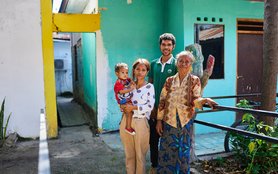NEW ORLEANS — African-Americans and Latinos living in New Orleans share remarkably similar experiences and are willing to work together to bridge differences according to a new study released today by Oxfam America and Dr. Silas Lee & Associates.
The new study, Building Common Ground, reveals vast similarities in the post-Katrina experiences of two groups often considered separately in discussions on hurricane recovery and rebuilding. While the study revealed many of the tensions and misconceptions that existed between the two groups, it demonstrated that there is very fertile ground upon which African Americans and Latinos can forge new relationships to combat some of the challenges they face together.
The results of the study will be presented Tuesday at 6 pm at Xavier University and will be followed by a panel discussion. Lydia Camarillo, Vice President of Southwest Voter Registration Education Project will deliver a keynote address following opening remarks from Xavier University president Dr. Norman Francis. Members of the panel include:
- Keron Blair, Interfaith Worker Justice
- Lucas Diaz, Puentes, Inc.
- Denis Soreano, New Orleans Worker Center For Racial Justice
- Saru Jayaraman, Restaurant Opportunity Center United, and
- Barbara Major, Citizens United for Economic Equity.
In one key finding, 83 percent of African Americans and 86 percent of Latinos said building alliances are important to achieving social and economic equity in New Orleans.
"Too often we talk about tensions between African-Americans and Latinos," said Ilana Scherl, Gulf Coast Field Representative for Oxfam America. "This study demonstrates that African Americans and Latinos face common challenges which limit their opportunities to succeed in society."
The study's results were driven from a survey conducted in late 2008 by Dr. Silas Lee & Associates of African Americans and Latinos living in New Orleans. Hundreds of residents were interviewed and participated in focus groups to gauge the issues and concerns affecting these communities.
The study found striking similarities, including:
- A majority of African Americans (56 percent) and Latinos (88 percent) said their communications and language skills were a major factor in the discrimination they face;
- A majority of African Americans (66 percent) and Latinos (59 percent) identified "access to decent affordable housing" as a major problem;
- Likewise, majorities of both African Americans (69 percent) and Latinos (60 percent) also identified "receiving fair treatment in the criminal justice system" as a major problem.
The report also identified some of the obstacles and opportunities for working together on the issues both groups experience:
- Language differences and a general lack of social interaction were identified as major barriers to creating alliances for social change in New Orleans;
- Both African Americans (60 percent) and Latinos (63 percent) said a lack of trust between the two groups was also a very major barrier to those alliance;
- Yet both groups agreed that the issue of job opportunities in New Orleans is very important, and worth working together to overcome, in fact, 88 percent of African Americans and 77 percent of Latinos said they strongly agreed that the groups can put aside their differences and work together on jobs.
Most importantly, both groups recognized the importance of working together on common issues, with one focus group participant saying "We have to be here, and we have to get along. How can we start the dialogue?"
"This survey goes a long way to deconstructing some of the myths that have sprung up after Katrina," said Dr. Silas Lee. "Contrary to popular belief, significant percentages of both African Americans and Latinos not only believe that the two groups can and should work together, but are willing to take steps to continue to the process of recovery together now."
"Building Common Ground: How shared attitudes and concerns can create alliances between African Americans and Latinos in a post-Katrina New Orleans," was published by Oxfam America. Read the full text of the report and detailed results of the survey.


